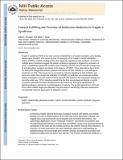Toward Fulfilling the Promise of Molecular Medicine in Fragile X
Author(s)
Krueger, Dilja; Bear, Mark
DownloadBear-Toward Fulfilling.pdf (436.5Kb)
OPEN_ACCESS_POLICY
Open Access Policy
Creative Commons Attribution-Noncommercial-Share Alike
Terms of use
Metadata
Show full item recordAbstract
Fragile X syndrome (FXS) is the most common inherited form of mental retardation and a leading known cause of autism. It is caused by loss of expression of the fragile X mental retardation protein (FMRP), an RNA-binding protein that negatively regulates protein synthesis. In neurons, multiple lines of evidence suggest that protein synthesis at synapses is triggered by activation of group 1 metabotropic glutamate receptors (Gp1 mGluRs) and that many functional consequences of activating these receptors are altered in the absence of FMRP. These observations have led to the theory that exaggerated protein synthesis downstream of Gp1 mGluRs is a core pathogenic mechanism in FXS. This excess can be corrected by reducing signaling by Gp1 mGluRs, and numerous studies have shown that inhibition of mGluR5, in particular, can ameliorate multiple mutant phenotypes in animal models of FXS. Clinical trials based on this therapeutic strategy are currently under way. FXS is therefore poised to be the first neurobehavioral disorder in which corrective treatments have been developed from the bottom up: from gene identification to pathophysiology in animals to novel therapeutics in humans. The insights gained from FXS and other autism-related single-gene disorders may also assist in identifying molecular mechanisms and potential treatment approaches for idiopathic autism.
Date issued
2011-02Department
Massachusetts Institute of Technology. Department of Brain and Cognitive Sciences; Picower Institute for Learning and MemoryJournal
Annual Review of Medicine
Publisher
Annual Reviews
Citation
Krueger, Dilja D., and Mark F. Bear. “Toward Fulfilling the Promise of Molecular Medicine in Fragile X Syndrome.” Annual Review of Medicine 62.1 (2011): 411–429.
Version: Author's final manuscript
ISSN
0066-4219
1545-326X